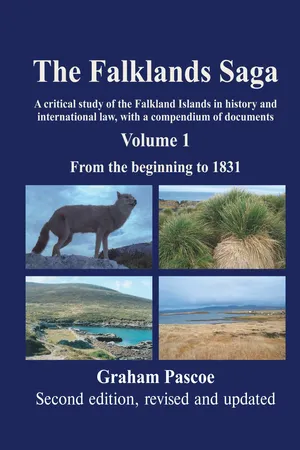
- 735 pages
- English
- ePUB (mobile friendly)
- Available on iOS & Android
About This Book
The Falklands Saga presents abundant evidence from hundreds of pages of documents in archives and libraries in Buenos Aires, La Plata, Montevideo, London, Cambridge, Stanley, Paris, Munich and Washington DC, some never printed before, many printed here for the first time, in English and, where different, in their original languages, Spanish, French, German, Italian, Latin or Dutch. It provides the facts to correct the fallacies and distortions in accounts by earlier authors.It reveals persuasive evidence that the Falklands were discovered by a Portuguese expedition at the latest around 1518-19, and not by Vespucci or Magellan.It demonstrates conclusively that the Anglo-Spanish agreement of 1771 did not contain a reservation of Spanish rights, that Britain did not make a secret promise to abandon the islands, and that the Nootka Sound Convention of 1790 did not restrict Britain's rights in the Falklands, but greatly extended them at the expense of Spain.For the first time ever, the despairing letters from the Falklands written in German in 1824 to Louis Vernet by his brother Emilio are printed here in full, in both the original German and in English translation, revealing the total chaos of the abortive 1824 Argentine expedition to the islands.This book reveals how tiny the Argentine settlement in the islands was in 1826-33. In April 1829 there were only 52 people, and there was a constant turnover of population; many people stayed only a few months, and the population reached its maximum of 128 only for a few weeks in mid-1831 before declining to 37 people at the beginning of 1833.This work also refutes the falsehood that Britain expelled an Argentine population from the Falklands in 1833. That myth has been Argentina's principal propaganda weapon since the 1960s in its attempts to undermine Falkland Islanders' right to self-determination. In fact Britain encouraged the residents to stay, and only a handful left the islands.A crucial document printed here is the 1850 Convention of Peace between Argentina and Britain. At Argentina's insistence, this was a comprehensive peace treaty which restored "perfect friendship" between the two countries. Critical exchanges between the Argentine and British negotiators are printed here in detail, which show that Argentina dropped its claim to the Falklands and accepted that the islands are British. That, and the many later acts by Argentina described here, definitively ended any Argentine title to the islands.The islands' history is placed in its world context, with detailed accounts of the First Falklands Crisis of 1764-71, the Second Falklands Crisis of 1831-3, the Years of Confusion (1811-1850), and the Third Falklands Crisis of 1982 (the Falklands War), as well as a Falklands perspective on the First and Second World Wars, including the Battle of the Falklands (1914) and the Battle of the River Plate (1939), with extensive details and texts from German sources.The legal status of the Falklands is analysed by reference to legal works, to United Nations resolutions on decolonisation, and to rulings by the International Court of Justice, which together demonstrate conclusively that the islands are British territory in international law and that the Falkland Islanders, who have now (2024) lived in their country for over 180 years and for nine generations, are a unique people who are holders of territorial sovereignty with the full right of external self-determination.
Frequently asked questions
Information
Table of contents
- Cover
- Title
- Contents
- General Preface
- Acknowledgements
- Introduction
- 1 Geography; landscape; climate; flora and fauna
- 2 Discovery and Possession
- 3 Later discoverers; the Falklands under many names, 1520-1760
- 4 Et ex Acadia ego: the first settlement in the Falklands
- 5 Britain – France – Spain; Spain takes over; the First Falklands Crisis
- 6 Sealing I; the “Maloons”; Whaling; the Spaniards; the Nootka Sound Convention, 1790; British invasions of Buenos Aires; end of the Spanish period
- 7 Unwilling residents I: Charles Barnard, the Falklands Crusoe
- 8 Sealing, II; Nathaniel Brown Palmer; the discovery of the South Shetlands
- 9 Unwilling residents II: Freycinet and the Uranie; James Weddell
- 10 The Jewett Episode, 1820-21
- 11 1821-1831: visitors; Louis Vernet; the 1824 expedition; General Rosas; Louis Vernet’s 5 years in the Falklands, 1826-31
- Glossary
- A Note on Log-Keeping
- Appendix
- Appendix B: Lists of People and Ships
- Bibliography
- Copyright